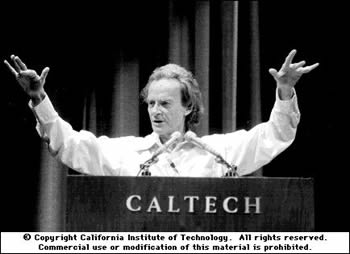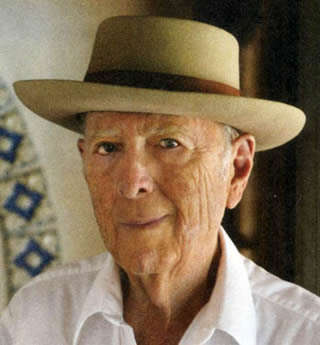Is the Stage Too Big for the Actors?
"When Time Will Have Reached Its Fulfillment"
For Sunday January 2, 2011
Lectionary Readings (Revised Common Lectionary, Year A)
Jeremiah 31:7–14 / Sirach 24:1–12
Psalm 147:12–20 / Wisdom of Solomon 10:15–21
Ephesians 1:3–14
John 1:1–18
Christmas is past, the New Year is future. It's that season of year when we live with a heightened sense of the passage of time. Our clocks and calendars remind us that time never stands still; it moves inexorably forward.
But where is time going?
Despite their differences (some real, many imaginary), on one fundamental point of reality science and Christianity agree: that time had a Beginning, and that time will come to a definitive End. The devil is in the details, of course, and when it comes to those details faith and science offer radically different stories about the significance of our Beginning and End.
For scientists (and most believers) the Beginning started with the Big Bang about 15 billion years ago. As for the End, in about 5 billion years from now, the sun will expand into a red giant 10,000,000 times its present volume and incinerate the earth. Since the sun itself is about 4.6 billion years old, we're about half way to the End of planet earth. "It is as sure as can be," writes the particle physicist and Anglican priest John Polkinghorne, "that humanity, and all forms of carbon-based life, will prove a transient episode in the history of the cosmos."
But the End of the earth is nothing, astronomically-speaking, compared to the End of the entire universe. My friend and solar physicist Charles tells me that physicists are divided about the future of the cosmos, but equally bleak. If the expansion of the Big Bang continues to propel everything outward, our galaxies will fly apart forever, although individual galaxies will collapse into black holes. But if the forces of gravity prevail, the universe will eventually reverse its expansion and collapse into a Big Crunch.
 |
Richard Feynman. |
In his new book The Language God Talks; On Science and Religion (2010), the Jewish novelist Herman Wouk (born 1915) asks whether this is an adequate story. Fifty years ago when he was researching his books The Winds of War (1971) and War and Remembrance (1978), Wouk met with the famous Caltech physicist Richard Feynman. "Do you know calculus?" Feynman asked Wouk. "You had better learn it," said Feynman, "it's the language God talks." Wouk tried but never did learn calculus, but he later had two more conversations with Feynman at the Aspen Institute.
Wouk has been ruminating about those conversations ever since, and in particular about an off-the-cuff remark that Feynman made in a television interview which later became a famous sound bite. In the interview Feynman said that "it doesn't seem to me that this fantastically marvelous universe, this tremendous range of time and space and different kinds of animals, and all the different planets, and all these atoms with all their motions, and so on, all this complicated thing can merely be a stage so that God can watch human beings struggle for good and evil — which is the view that religion has. The stage is too big for the drama."
No, Wouk amicably objects, the stage is not too big. He might not know calculus, but he insists that he knows God's "other language" in the Talmud. Besides, science is hardly immune to our messy human drama of doubt, error, vanity, ignorance, ridicule and politics. Science depends upon faith in the opinions of elite authorities, which opinions sometimes disagree about fundamental matters ("No one understands quantum mechanics," Feynman once said.). It can build the atom bomb but provide precious little moral wisdom about its use, or explain the magic of genetics but not how to raise a teenager.
Has the last 15 billion years really been such a "vastly drawn-out complex purposeless nonsense?" asks Wouk. "I'll venture that not even a solid savant like Steven Weinberg can believe that, not in his innermost soul." Art, human joy and sorrow, the mystery of human consciousness, the beauty and terror we experience in creation, all these hints do not prove anything but nevertheless suggest that our human drama does indeed have an overall Plot and Author. The readings for this week retell this alternate story.
The first sentence in John echoes the first sentence of the Bible. Genesis 1:1 reads, "In the beginning God created the heavens and the earth." John 1:1 reads, "In the beginning was the Word." Why does John do this? What is he saying to us? Beyond the obvious literary affinity, what's the deeper connection between the Jesus of John and the God of Genesis?
John 1:1–18 makes two connections between Jesus and Genesis which together constitute the sum and substance of Christianity's alternate story of the cosmos. John links Genesis and Jesus in order to connect creation and redemption. Jesus embodies the revelation of the invisible God and he enacts the redemption of the material creation. He is the infinite and eternal Logos who entered time and became finite flesh. Just as God's glory inhabited the tabernacle and temple in the Old Testament, his glory "tabernacled" in the fleshly body of Jesus. In Jesus God created the world, says John, and in Jesus God redeems the world.
Paul makes a similar point with equal literary flourish. In the original Greek text, Ephesians 1:3–14 is one long, ponderous sentence that piles clause upon clause. Mrs. Tilley, my ninth grade English teacher, would give Paul a failing grade for grammar. Different translations of the Bible struggle to punctuate Paul's syntax. But like John, beyond his tortured prose, Paul connects creation and redemption.
 |
Herman Wouk. |
Whereas John and Genesis begin at the beginning of creation, Paul imagines a scenario "before the creation of the world" (1:4). Although this sounds like science fiction, I take his words at face value. The universe is about 15 billion years old, and even though that's an unimaginably large number, it's still a finite number. What came "before" the beginning of space and time? And when in the distant but certain future the universe flies apart from a continued expansion of the Big Bang, or collapses into a Big Crunch from the forces of gravity, what comes "after" that?
Paul says that the chronological march of clocks and calendars started by the Big Bang is going somewhere rather than nowhere; he says that time itself is progressing toward a "fulfillment." He tells the Ephesians that the "mystery of God's will," hidden in eternity past, is revealed in the first century Jesus. All creation will receive its redemption when God "brings all things in heaven and on earth together under one head, even Christ."
Paul's remarkably comprehensive vision embraces all space and time. The future redemption of the original creation is so central to his thought that he repeats these ideas in nearly identical language in four additional epistles besides Ephesians. It's like Paul had a computer and did a cut-and-paste of his thoughts to five different churches.
The ultimate destiny of all creation is liberation and freedom, adoption and redemption. The scale and scope of this future hope encompasses "the whole creation" (Romans 8:12–25; cf. 1 John 2:2). God "created all things in heaven and on earth" (Colossians 1:16). He seeks the worship of all "things in heaven, and things in earth, and things under the earth" (Philippians 2:9–11). He will "reconcile to himself all things, whether things on earth or things in heaven" (Colossians 1:20). Since He will sum up or bring together "all things in heaven and on earth" (Ephesians 1:10), then of course God delights in bestowing his fatherly favor on "the whole human family in heaven and on earth" (Ephesians 3:15). Paul's incremental logic is palpable —redemption is the destiny of each person, every nation, all creation, and the whole cosmos — not only on earth but "under the earth and in heaven."
God was in Christ, says Paul, "reconciling the cosmos to himself" (2 Corinthians 5:19). The creation of Genesis will meet its redemption in Jesus. This is an affirmation of religious faith, of course, and not an assertion of scientific fact. But as Wouk reminds us, scientific facts alone do not always make for a completely satisfying story.
Image credits: (1) Streaming-Madness.net; (2) RhapsodyInBooks.





